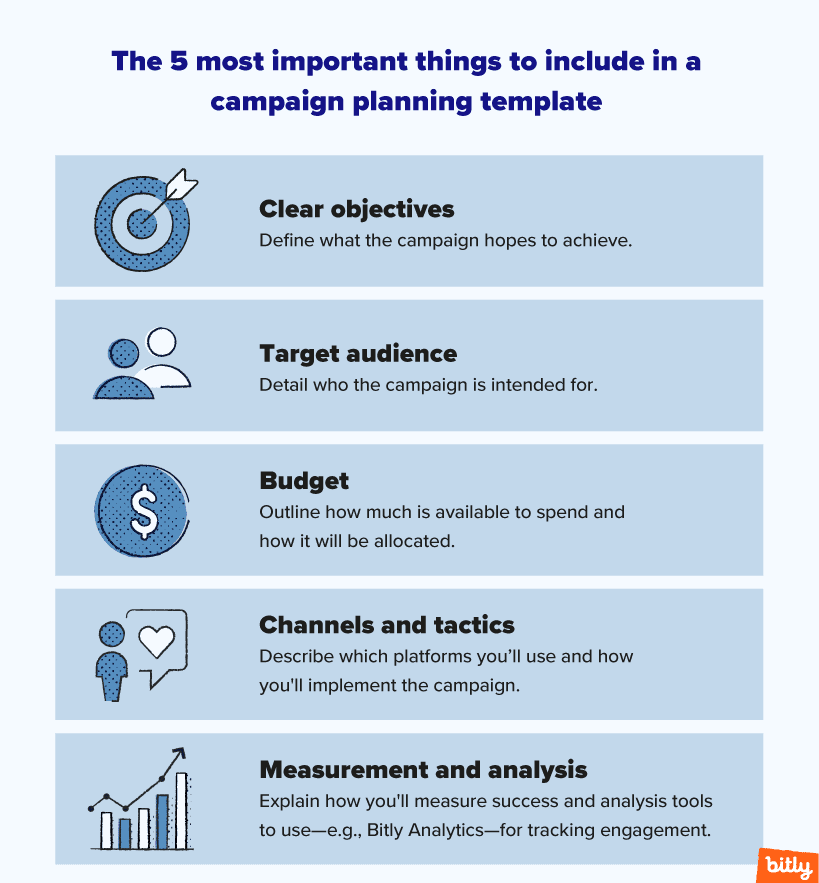Are you a marketer looking to elevate your marketing efforts? Do you have goals that you want to achieve in a specified time? If so, then creating a campaign plan can help. An effective campaign plan lets you understand the objectives, challenges, and delivery modes present on the road to achieving your targets.
Campaign planning also helps you track how a particular cross-channel marketing strategy is performing toward reaching the desired outcomes. However, because of the many tools and platforms you need to incorporate into your campaign strategy, creating an effective plan can sometimes feel confusing.
This article digs deeper into the process of creating a winning plan for your digital marketing campaigns.
What does the campaign planning process look like?
Digital campaigns are the backbone of every marketing strategy you can develop. Whether it’s a new product or service you’re marketing, they can help you achieve your objectives, increase brand awareness, and attract more clients for increased sales.
However, planning successful campaigns is not always easy. Why? Because there’s a lot you’ll need to capture in every step, and it’s possible to get lost along the way.
Let’s take a closer look at the process of planning a marketing campaign:
- Set goals: Understand the “why” of your campaign, what you wish to achieve, and for how long. Tailor your goals to your product or service, customer satisfaction, or sales. Strategizing the objectives will help you monitor the entire campaign’s performance.
- Determine your budget: How much do you wish to spend on a particular campaign? Whatever the marketing channels you wish to use, set a realistic budget to support the campaign. You may stick by the common rule: 2–5% of your revenue for B2B companies and 5–10% for B2C companies.
- Understand the audience: Knowing who to address in your campaigns creates room for return on investment. As you define your target market, consider their demographic, geographic, and psychographic details. For example, consider your audience’s age, city-level data, and lifestyle traits. For B2B marketing, you may also include the company size, industry, and location. This information helps you personalize your campaigns to resonate with the target group.
- Craft your message: What do you want to talk about? Ensure the message addresses your audience’s pain points and how your services and products can provide a solution to them. Also, ensure the message shows that you are a credible expert in your industry.
- Implement your campaign: After putting everything in place, it’s time to actualize it. But before that, make sure you’ve reviewed and adjusted it accordingly.
- Monitor your results: This is an opportunity to check whether you’re on track with the marketing objectives you set. Continuous analysis of the metrics ensures you understand what marketing channels are doing better and the targets that responded best.
The 5 most important things to include in a campaign planning template
A template can help you delegate roles to team members, understand deadlines, and seamlessly allocate resources for your entire campaign.
The following are essential components that you should include in a marketing plan template. Including these elements allows you to reuse and build from the same template for future campaigns.
- Clear objectives: Define what the campaign hopes to achieve.
- Target audience: Detail who the campaign is intended for.
- Budget: Outline how much is available to spend and how it will be allocated.
- Channels and tactics: Describe which platforms you’ll use and how you’ll implement the campaign.
- Measurement and analysis: Explain how you’ll measure success and analysis tools to use—e.g., Bitly Analytics—for tracking engagement.

When do you need a marketing strategy and a campaign plan?
A solid marketing strategy and a detailed campaign plan are crucial elements for a successful marketing initiative. However, there is a significant difference between the two concepts: The former is long-term, whereas the latter is short-term.
In addition, a campaign plan comes first. You use it to outline what you hope to achieve in your marketing efforts and the mechanisms you intend to use. It is used to implement a more specific initiative, for example:
- When introducing a new product to the market.
- When offering promotions aimed at increasing sales, for example, coupons.
- During branding efforts that focus on improving awareness.
- When marketing your content as a method of lead generation.
On the other hand, a marketing strategy defines how you will achieve your campaign goals. Here, you identify the target audience and define the marketing channels you’ll use to reach them. For example, you may choose to advertise your products on social media, in magazines, or through content marketing.
A marketing strategy increases the chances of turning your audience into customers, increasing revenue for the business.
When creating a campaign plan, it’s important to consider the means for achieving marketing objectives, optimize resources, and respond to marketing opportunities. This allows you to maintain consistency in messaging and positioning, save money, and identify areas of continuous improvement and innovation.
How to structure your marketing campaign plan
A well-structured campaign plan can align team efforts, streamline processes, and increase the chances of achieving your business objectives. The following are tips to observe to ensure you’ve enjoyed maximum benefits from your marketing goals:
Define your campaign objectives
One thing you should consider when creating a campaign plan is your goals. Think of why you’re planning the campaign and what you want to achieve. Do you want to increase sales or improve your business’s public image? Whatever the need, ensure your goals are SMART—specific, measurable, attainable, relevant, and time-bound.
SMART objectives provide direction and focus for the campaign, guiding activities toward the desired outcomes.
Remember to tailor your goals based on key performance indicators (KPIs) to know when you’ve achieved a target and if your efforts are effective. Tools like Bitly Campaigns can help you measure and track your goals against performance metrics, allowing for effective evaluation and campaign success.
Figure out what resources you need
Once you’ve outlined the goals of your campaign, determine the tools that will help you achieve them. Will you need new landing pages, copy, social media posts, or visuals? How much will it cost you to execute the whole plan?
Effective resource allocation is important for the campaign’s feasibility and success. So, include all marketing teams in creating a roadmap and identify every resource required in each phase.
Involve the appropriate people
Assembling the right team is essential for campaign planning and execution. Further, collaboration and clear roles are vital for your campaign’s success. Include internal staff like your marketing manager and external partners like stakeholders and vendors in the planning process. They may have valuable insights that will help drive results for the marketing campaigns.
You can narrow down the requirements for your internal team into tasks and assign members to accomplish them. Then, you can use a campaign planning template to track the progress of team members and ensure they complete their tasks by the set deadlines.
Figure out which marketing channels make sense
Choosing the right marketing platforms is essential for the success of your campaign. Here are some tips to help you determine what mediums to use for marketing activities:
- Consider your campaign goals: Define your objectives and choose the channels that align with them. For example, if you’re focused on increasing brand awareness and driving more traffic, you may choose a channel like LinkedIn, which has over 1 billion users globally. This means more people are likely to see your content here.
- Understand your target audience: Where do your prospects spend most of their time? Which sites do they visit frequently? For your campaign strategy to be effective, you’ll need to know where and how to reach them. Ensure the platform you choose promotes cross-device attribution and can drive preferred actions to target customers, such as inquiries, purchases, or signups.
- Consider available resources: These include budget, time, content creation skills, and your knowledge in handling the marketing channel. Also, ensure your chosen channel offers a realistic return on investment, considering its pricing and productivity.
- Check out your competitors: For a marketing campaign to succeed, you’ll need to assess how the market performs. This includes knowing your competitors and the channels they are using. With this, you can learn what campaign strategy is working well and get insights into the marketing platforms to use.
Avoid wasting resources or budget by focusing on channels that are not relevant to or effective for your campaign goals.
Create a strict timeline to meet campaign goals
Creating a detailed timeline that outlines key milestones, deadlines, and deliverables is vital for keeping track of your campaign initiatives and executing marketing activities on time. A strict timeline also helps to manage team members’ time and resources effectively.
Monitor, measure, and track the entire campaigns
Continuous monitoring and measurement are crucial for evaluating the performance of your campaigns. Have each team member update the progress of the assigned tasks and cross-check them to ensure everything aligns with your goals.
Also, leverage tools to track key performance indicators against your objectives to identify improvement areas. Bitly Analytics, for example, can provide valuable insights into campaign performance, such as the kind of content that resonates with your audience, as well as highlight your customer demographics. This can inform decisions and adjustments regarding the type of content to create and where to focus your marketing resources.
Upgrade your marketing efforts with strategic campaign planning
Campaign planning helps you understand your goals, challenges, and the performance of your marketing strategies. By defining desired outcomes and allocating resources efficiently, you can streamline your efforts and maximize results within the set budget.
With Bitly, you can optimize and track the performance of your digital marketing initiatives and achieve better outcomes with less wasted time. Whether you’re a business owner interested in identifying your customer demographics or a marketer looking for insights into the best type of content or your target audience, the Bitly Connections Platform can help!
Ready to upgrade your marketing efforts? View our plans and unlock the power of campaign planning with Bitly today.




